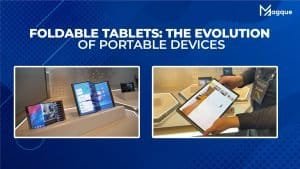Are tablets the futuristic answer to our laptop woes, or are they just a passing trend? In the ever-evolving world of technology, the debate rages on. Let’s dive into the pros and cons of using tablets as laptop replacements to uncover the truth behind this digital dilemma.
The Pros of Tablets as Laptop Replacements
One of the most enticing aspects of tablets is their portability. Imagine carrying a lightweight device that slips effortlessly into your bag, ready to be pulled out whenever inspiration strikes. Whether you’re a student rushing between classes or a business professional jet-setting across the globe, tablets offer unparalleled convenience.
Moreover, tablets boast impressive battery life, keeping you powered up for hours without needing to hunt for an outlet. Say goodbye to the anxiety of your laptop dying mid-presentation or halfway through binge-watching your favorite series.
Another advantage of tablets is their touchscreen functionality. With a simple swipe or tap of your finger, you can easily navigate tasks, making them particularly appealing for those who prefer a more tactile experience. The absence of a physical keyboard means more screen real estate for immersive content consumption or creative endeavors.
The Cons of Tablets as Laptop Replacements
While tablets have their merits, they also come with their fair share of drawbacks. Productivity is a significant concern for many users, especially those accustomed to the multitasking capabilities of traditional laptops. Despite advances in app development, tablets still need to catch up to laptops when running demanding software or handling complex tasks.
Furthermore, the need for a physical keyboard can be a dealbreaker for some individuals. While touchscreen keyboards have improved over the years, they may offer a different level of comfort or efficiency than their tactile counterparts. This limitation can become a source of frustration for users who frequently type long documents or emails.
Additionally, tablets often lack storage capacity. With most models maxing out at a fraction of the storage available in laptops, users may find themselves constantly juggling files or relying on cloud-based solutions to free up space.
Making the Decision: Tablet or Laptop?
Choosing between a tablet and a laptop depends on your specific needs and preferences. Suppose portability and convenience are your top priorities. In that case, a tablet may be the perfect solution for staying connected on the go. However, if you rely heavily on productivity software or require ample file storage, a laptop might be the more practical choice.
Before deciding, consider how you’ll primarily use the device and what features are essential to your workflow. Whether you opt for the versatility of a laptop or the mobility of a tablet, rest assured that both devices have their place in the ever-expanding landscape of technology.
In conclusion, tablets offer a compelling alternative to traditional laptops but come with their trade-offs. By carefully weighing the pros and cons, you can make an informed decision that best suits your needs and lifestyle.
Explore the world of tablets and laptops with Magque, your ultimate destination for tech reviews and insights. Stay tuned for more expert analysis and recommendations to help you confidently navigate the digital realm.
FAQs
1. Can tablets truly replace laptops in terms of functionality?
While tablets have come a long way in terms of performance and versatility, they still may need to match the functionality of traditional laptops for specific tasks. While tablets excel in portability and touchscreen interaction, laptops often offer more robust processing power and multitasking capabilities.
2. Are tablets suitable for professional use, such as business presentations or content creation?
Tablets can undoubtedly be used for professional purposes. Still, their suitability depends on the specific requirements of the task at hand. A laptop may be more practical for tasks involving intensive software usage or extensive typing. However, tablets can be excellent for presentations, note-taking, and primary content-creation tasks.
3. How does the cost of tablets compare to that of laptops?
In general, tablets are more affordable than laptops, especially at the lower end of the price spectrum. However, the price difference between tablets and laptops may become less significant as you move into higher-end models with more advanced features and capabilities. It’s essential to consider your budget and desired features when purchasing.
4. What are the main limitations of using tablets as laptop replacements?
Some of the main limitations of tablets as laptop replacements include their smaller screen size, reduced processing power compared to laptops, and limitations in terms of software compatibility. Additionally, the need for a physical keyboard and limited storage capacity can be drawbacks for specific users.
5. Are there any specific scenarios where tablets are superior to laptops?
Yes, there are several scenarios where tablets shine in comparison to laptops. For example, tablets are excellent for casual web browsing, reading e-books, consuming multimedia content, and using touchscreen-based apps. They’re also ideal for situations where portability is paramount, such as travel or outdoor work environments. However, laptops may still be the preferred choice for tasks requiring extensive typing, heavy-duty software usage, or intricate multitasking.
Read Also This:- The Best Tablets for Professionals













